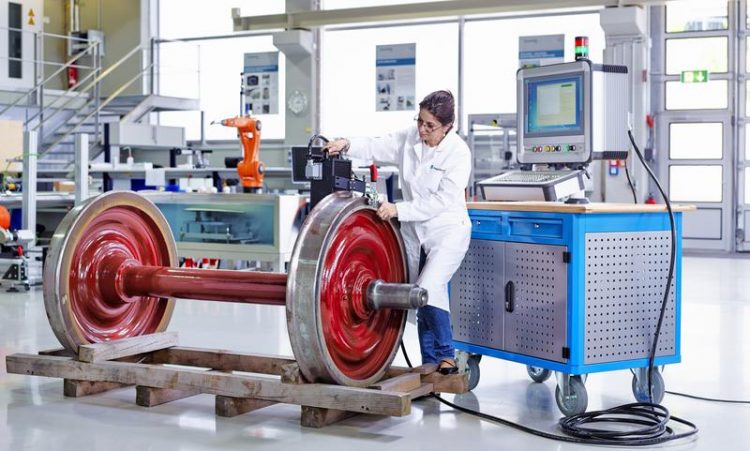Detecting residual stresses on freight train wheels

Determination of residual stresses in freight train wheels Uwe Bellhäuser
In the case of a car, the braking operation is carried out in seconds – jamming on the brakes and shortly afterwards the vehicle has stopped. But with a fully loaded freight train weighing lots of tons braking takes much longer – on long descents braking, which is required to prevent the train’s unwanted acceleration, can even take more than 30 minutes.
For the wheels and brakes this long braking time means hard work – such a strong mechanical loading and heating of the wheels may cause so-called tensile residual stresses, which can lead to cracks in the wheel tread and – worst case – to wheel breakage.
Geislinger Steige and Tauernbahn are best examples for routes that cause heavy endurance stress in wheels. Their strong inclinations and partly narrow radii require the permanent use of the wagons´ block brakes which generate the braking force by pressing the brake shoes against the tread of the wheels.
The scientists and engineers of the Fraunhofer Institute for Nondestructive Testing IZFP performed an elaborate redesign of the hard- and software of the so-called UER systems* by evaluating the experience gained with previous versions of the systems. Thus, they succeeded in adapting the new versions even better to the specific needs of the maintenance and wheel manufacturers plants.
While maintaining ease of use a variety of options for customer-specific documentation and report generation have been added. In particular, for the testing of newly manufactured wheels an optional software evaluation module is now available.
All UER systems, the new ones as well as all previously delivered systems, are integrated into the remote maintenance network of Fraunhofer IZFP, i.e. in case of a failure the service team is able to perform an extensive error analysis by remote access via Internet.
The inspection instruments are applied in the manufacturing process of new wheels, but especially in the maintenance of the freight train wheels.
Media Contact
All latest news from the category: Trade Fair News
Newest articles

Parallel Paths: Understanding Malaria Resistance in Chimpanzees and Humans
The closest relatives of humans adapt genetically to habitats and infections Survival of the Fittest: Genetic Adaptations Uncovered in Chimpanzees Görlitz, 10.01.2025. Chimpanzees have genetic adaptations that help them survive…

You are What You Eat—Stanford Study Links Fiber to Anti-Cancer Gene Modulation
The Fiber Gap: A Growing Concern in American Diets Fiber is well known to be an important part of a healthy diet, yet less than 10% of Americans eat the minimum recommended…

Trust Your Gut—RNA-Protein Discovery for Better Immunity
HIRI researchers uncover control mechanisms of polysaccharide utilization in Bacteroides thetaiotaomicron. Researchers at the Helmholtz Institute for RNA-based Infection Research (HIRI) and the Julius-Maximilians-Universität (JMU) in Würzburg have identified a…



